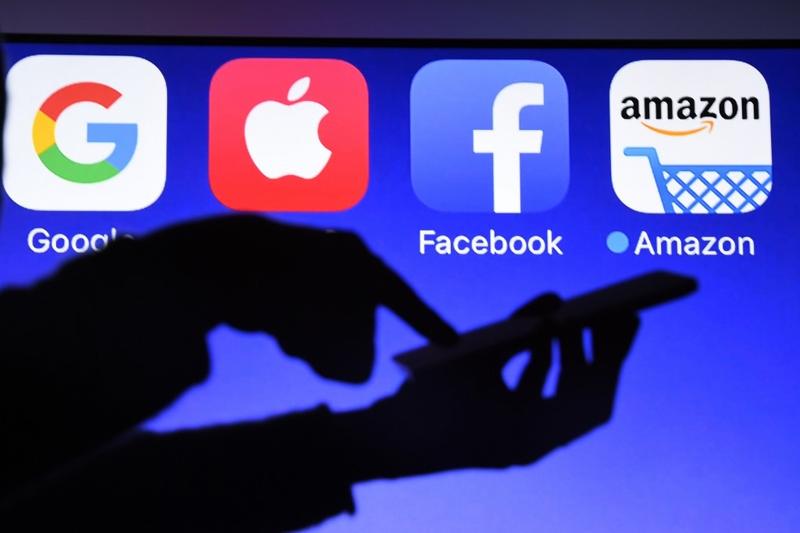 This Sept 28, 2017, photo shows a smartphone being operated in front of GAFA logos (acronym for Google, Apple, Facebook and Amazon web giants) as background in Hédé-Bazouges, western France. (DAMIEN MEYER / AFP)
This Sept 28, 2017, photo shows a smartphone being operated in front of GAFA logos (acronym for Google, Apple, Facebook and Amazon web giants) as background in Hédé-Bazouges, western France. (DAMIEN MEYER / AFP)
Facebook Inc on Wednesday warned that privacy changes coming from Apple Inc could hurt smaller developers such as gaming companies disproportionately but will likely leave its own apps mostly unscathed.
Facebook said it was considering discontinuing on iPhones a tool called Audience Network, which thousands of developers put into their apps to serve ads
In a blog post, Facebook said it was making a change to its own apps - which in addition to its flagship app also include WhatsApp and Instagram - that would likely spare them from having to ask iPhone users for data-tracking permissions that many advertising industry insiders believe users will refuse.
Facebook shares surged 8.2 percent on Wednesday to close at US$303.91, a record high for a second straight day.
ALSO READ: News publishers push back against Apple's app store terms
In a blog post, Facebook said it was also making changes that could hurt smaller developers that use a Facebook tool for serving apps in third-party apps. The changes come ahead of Apple’s new rules, which require increased user notifications for ad tracking and will take effect when new iPhones arrive this fall.
Facebook said it was considering discontinuing on iPhones a tool called Audience Network, which thousands of developers put into their apps to serve ads. Facebook collects data about users from the apps where it serves those ads, which it uses to inform highly tailored targeting throughout its business.
"Apple's updates may render Audience Network so ineffective on iOS 14 that it may not make sense to offer it on iOS 14," Facebook said in a blog post.
The Audience Network business, while an important source of revenue and traffic to small developers such as gaming companies, is far from Facebook’s biggest business, said Brian Wieser, global president of business intelligence at GroupM. “It would surprise me if it was greater than US$1 billion on a net basis,” he said.
Apple previously provided a tool called the identifier for advertisers, or IDFA, that allowed Facebook and others to engage in such tracking of users across apps.
But in June, the iPhone maker said such activity will require a pop-up notification saying the app “would like permission to track you across apps and websites owned by other companies.” Digital advertising firms expect most users will decline to grant that permission.
“Apple is saying, we had an ‘opt out’ system before, and we’re going to switch to an ‘opt in’ system,” said Craig Danuloff, chief executive of The Privacy Co, which makes an app to help users assess how private their data is.
“What do advertisers say? They immediately assume it’s Armageddon. They just know nobody really wants this.”
As an alternative to the tracking tools it previously provided advertisers, Apple created a new advertising network technology that was better for privacy protection of users.
Facebook on Wednesday said it would stop using Apple’s older tracking tools in its own apps and adopt Apple’s new offering, though it said Apple’s new technology “limits the data available to businesses for running and measuring campaigns.”
The changes Facebook announced Wednesday will fall hardest on ads that prompt users to install new mobile apps, a format that is heavily used in the video game industry.
“Apple’s iOS 14 changes will certainly negatively affect the way that game studios and publishers currently raise revenue and gain users through sales targeted advertisements,” Renee Gittins, executive director of the International Game Developers Association, said in a statement.
John Nardone, chief executive of ad serving software company Flashtalking, said Apple’s move to restrict its ad business could be viewed as anti-competitive by raising prices for consumers used to free, ad-supported apps.
“There’s self-interest in Apple doing this because as the advertising revenue stream becomes more difficult, then apps have to charge users and Apple, as you know from the Epic Games case, takes 30 percent of that,” Nardone said. “Apple doesn’t have a stake in ads but they have a stake in paid apps.”
For publishers the burden may be less, said David Chavern, president of the News Media Alliance, which represents several major US publishers.
READ MORE: Antitrust probe: Apple 'proposes' US$84m to support businesses
Many rely on what is known as first-party data, such as which stories a user reads, to determine which ads to show, an activity which is not subject to Apple’s new rules.
“News publishers aren’t huge beneficiaries of cross-app tracking and, more broadly, we all see the ecosystem moving against highly targeted programmatic ads,” he said. “There may end up being benefits to publishers from that, such as a some move back to contextual advertising.”


